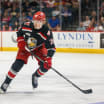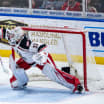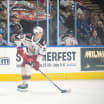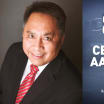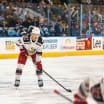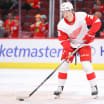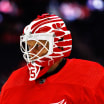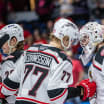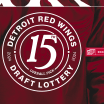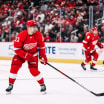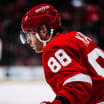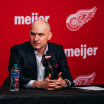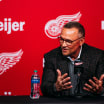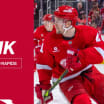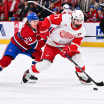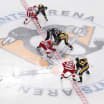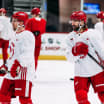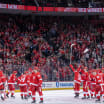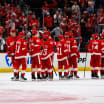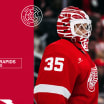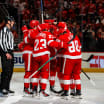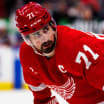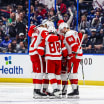Red Kelly: Trailblazer on the blue line
Hall of Fame defenseman was league's first Norris Trophy winner
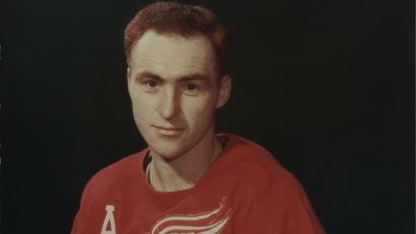
A Hall of Fame Detroit Red Wings defenseman from 1947-60, the Red Wings announced Thursday that Kelly's No. 4 would be retired.
Kelly's number will be the eighth honored by the team and the first to be lifted into the rafters since the opening of Little Caesars Arena in 2017.
As Detroit won four Stanley Cups between 1950-55, Kelly reigned as the NHL's best defenseman. Some in the league viewed him as worthy of an even loftier position within the hierarchy of the game's top players.
During the 1953-54 season, Boston Bruins coach Lynn Patrick was convinced that the best player in the NHL resided on the roster of the Red Wings.
Surprisingly, it wasn't Gordie Howe, even though Mr. Hockey would lead the NHL in scoring for a fourth straight season that year. Nor was it Wings captain Ted Lindsay, the third-leading scorer in the NHL in 1953-54, or netminder Terry Sawchuk, who'd finish as the league leader with 35 wins.
No, as far as Patrick was concerned, the straw who stirred the drink, the man who made it all click for the Wings, was Kelly.
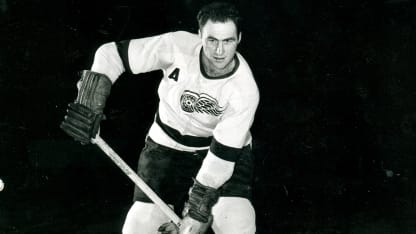
"Kelly is the best all-around performer in our league," Patrick told the Associated Press. "Sure, Howe and (Montreal's Maurice) Richard are good, but Red is not only good on defense, he can score, too.
"When Kelly rushes up the ice, it's something to see. He sparks Howe and Lindsay and the others. When we play the Wings, we go out to stop him. We feel there's a better chance of winning that way."
That season, Kelly was named the inaugural winner of the James Norris Memorial Trophy as the NHL's best defenseman. It was fitting that a Red Wings player was the first winner of the award, since it was christened to honor the memory of Red Wings owner James Norris, who died in 1952. Kelly was a landslide winner, garnering 162 of 180 possible votes.
Kelly's 16-33-49 totals led all NHL defensemen and were good enough for sixth in the overall league scoring race, the highest finish by a defenseman since 1921-22. Assessed just 18 penalty minutes in 62 games in 1953-54, Kelly also won the Lady Byng Trophy for exhibiting the best combination of sportsmanship and high standard of play.
To date, Kelly is the only defenseman to capture the Lady Byng-Norris combination in the same season. In fact, he's the only defenseman in NHL history to have won both awards.
"You've got to go all the way back to Eddie Shore to find one in his class," New York Rangers general manager Frank Boucher said at the time. Shore won four Hart Trophies with the Boston Bruins in the 1930s. "The red head attacks like a great forward and defends like an even greater defenseman. There's nobody like him for taking the pressure off his own team and in a few seconds, applying it to the other guys."
That was Kelly's third Lady Byng as a Wing. No other NHL defenseman has won it more than once. It was Bill Quackenbush, Kelly's initial NHL defense partner , who was the first defenseman to earn the award, and Kelly credits Quackenbush for teaching him how to play cleanly and effectively along the blueline.
"He showed me the subtle things you could do to avoid taking penalties," Kelly said. "Things like body positioning and using your stick to take the puck off an opponent."
Kelly was selected to the NHL's First All-Star Team six times, including five successive seasons from 1950-51 through 1954-55. He was also a two-time second-team choice. He skated in 10 NHL All-Star Games and served as captain of the Wings from 1956-58.
Amazingly, were it not for the intrepid work of Wings scout Carson Cooper, none of it would have ever unfolded in a Detroit uniform.
Watch: Red Kelly won Cup four times each with Wings, Leafs
As an amateur, Kelly was the property of the Toronto Maple Leafs and played junior in their system with the St. Michael's Majors. But the Leafs brass didn't think Kelly was of NHL fettle.
"Toronto scouts thought I would never play 20 games in the NHL," Kelly said.
The Leafs were convinced Kelly wasn't an NHL-caliber skater -- the same misjudgement they'd made a couple of years earlier with Lindsay, another future Hall of Famer on the St. Mike's roster who would be scooped up by the Wings.
St. Mike's coach Joe Primeau, a Leafs star from the 1930s and a Hall of Famer himself, sought to warn his bosses of the error of their ways.
"Kelly wasn't much of a skater, but he was very strong," Primeau explained to the Windsor Star. "He had the big arms and legs of a ploughboy. He kept on getting better and better. His skating seemed to improve with every week."
It was Primeau who converted Kelly from left wing to the blueline. Kelly learned his lessons well and after signing with the Wings in the fall of 1947, jumped directly from junior into the NHL.
Kelly was part of a crop of legendary players that joined the Wings between 1944-50, a group that also included Howe, Lindsay, Sawchuk, Marcel Pronovost, Alex Delvecchio and Harry Lumley, all of them future Hall of Famers.
He would play in the Stanley Cup final in each of his first three NHL campaigns, but after tasting the heartbreak of back-to-back final sweeps at the hands of the Leafs in 1947-48 and 1948-49, Kelly and the Wings would finally win it all in 1949-50.
The Leafs and Wings met in the semifinals that spring and Detroit rallied to win a bitter seven-game set after losing Howe to a near-fatal head injury in Game 1. To help fill the void of the loss of his best player, Detroit coach Tommy Ivan moved Kelly up to the wing.
"We seemed to come together after that," Kelly said. "The first two years, they had bounced us in four straight games, after we had gone seven games with Montreal in the semifinals."
More Stanley Cup glory would follow in 1951-52, 1953-54 and 1954-55, as well as seven straight first overall finishes from 1948-49 through 1954-55, an NHL record.
The Wings had to take a home-and-home set from Montreal in the final week of the 1954-55 regular season in order to make sports history.
"The (New York) Yankees had won (a North American sports record) six (regular-season titles) and we knew that," Kelly said. "We were trying to win that seventh one.
"We had the (Richard) riot in Montreal (when Detroit beat Montreal by forfeit after Canadiens fans rioted to protest the suspension of Montreal star Maurice Richard) and then we had to play the last game against them in our rink and we couldn't lose. We had to win both games and we did."
Kelly, Howe, Lindsay, Pronovost and Marty Pavelich were teammates on all four Cup winners.
A 1960 trade to the Leafs, the team that originally didn't want him, allowed Kelly to add to his list of unique accomplishments. Converted to center, Kelly won another Lady Byng, becoming the only player in the history of the award to win it as a forward and a defenseman. He'd win four Cups with Toronto, including three in succession. Kelly is one of four players in NHL history to win back-to-back Cups with two different teams, and his eight Cups in total are the most won by someone who never played for the Canadiens.
Kelly was inducted into the Hockey Hall of Fame in 1969, but none of his multitude of accomplishments would have ever occurred if the Wings didn't believe that he had the goods when other NHL teams didn't.
"They were things you dreamed about," Kelly said of his list of hockey accomplishments. "You never knew they were going to happen, and then they did happen."
Kelly's No. 4 will take its place alongside Sawchuk (No. 1), Nicklas Lidstrom (No. 5), Lindsay (No. 7), Howe (No. 9), Delvecchio (No. 10), Sid Abel (No. 12) and Steve Yzerman (No. 19) among the Red Wings' honored numbers.

